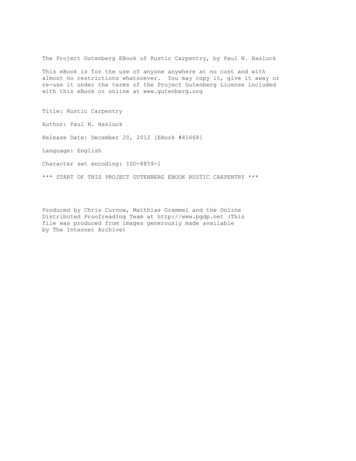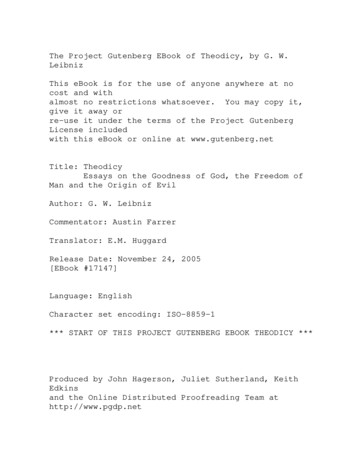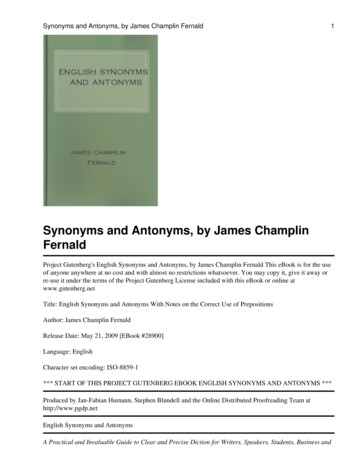
Transcription
The Project Gutenberg EBook of The Lives of the Saints, Volume II (of 16):February, by Sabine Baring-GouldThis eBook is for the use of anyone anywhere at no cost and withalmost no restrictions whatsoever. You may copy it, give it away orre-use it under the terms of the Project Gutenberg License includedwith this eBook.Title: The Lives of the Saints, Volume II (of 16): FebruaryAuthor: Sabine Baring-GouldRelease Date: May 7, 2014 [EBook #45604]Language: EnglishCharacter set encoding: ISO-8859-1*** START OF THIS PROJECT GUTENBERG EBOOK LIVES OF THE SAINTS, VOL II ***Produced by Greg Bergquist, Chris Pinfield and the OnlineDistributed Proofreading Team at http://www.pgdp.net (Thisfile was produced from images generously made availableby The Internet Archive/American Libraries.)Transcriber's Note:Notes and lists in smaller type in the original have been indented twospaces.Illustrations on separate plates have been incorporated in the text.Small capitals have been replaced by full capitals, italics areindicated by underscores , and "oe" ligatures have been removed.Apparent typographical errors have been corrected. The use of hyphensis not always consistent.THE
Lives of the SaintsREV. S. BARING-GOULDSIXTEEN VOLUMESVOLUME THE SECOND[Illustration: THE REPOSE IN EGYPT, WITH DANCING ANGELS. After LucaCranach.By the robbery of the nest in the tree, the painter ingeniouslypoints to the Massacre of the Innocents as to the cause of the Flightinto Egypt. Feb.-Front.]THELives of the SaintsBY THEREV. S. BARING-GOULD, M.A.New Edition in 16 VolumesRevised with Introduction and Additional Lives ofEnglish Martyrs, Cornish and Welsh Saints,and a full Index to the Entire WorkILLUSTRATED BY OVER 400 ENGRAVINGSVOLUME THE SECONDFebruaryLONDONJOHN C. NIMMO14 KING WILLIAM STREET, STRANDMDCCCXCVII
Printed by BALLANTYNE, HANSON & COAt the Ballantyne Press[Illustration]CONTENTSAS. Abraham" Adalbald" Adelheid" Adeloga" Æmilian" Agatha" Aldetrudis" Alexander" Alnoth" AmandusSS. Ananias and comp.S. Andrew Corsini" Angilbert" Ansbert" Anskar" Apollonia" Aristion" Athracta" Augulus" Auxentius" Auxibius" Aventine of Chateaudun" Aventine of Troyes" 562313662361902993398684138BS. Baldomer" Baradatus" Barbatus" Belina" Benedict of Aniane" Berach447368342344284307
"""""""BerlindaBertulfBesasBlaiseBoniface, LausanneBridgetBruno501394424734314304CS. Cæsarius" Castor" Catharine de Ricci" Ceadmon" CelerinaSS. Celerinus and comp." Charalampius and comp.S. Chronion" Chrysolius" Clara of RiminiSS. Claudius and comp." Constantia and comp.S. Cornelius of Rome." Cornelius the Cent." S. Damian" DarlugdachSS. Dionysius and othersS. Dionysius (Augsburg)" Dorothy" Dositheus37622212432176378ES. Earcongotha" Eleutherius" ElfledaSS. Elias and othersS. Ephraem, Syrian" Ermenilda" Ethelbert" Ethelwold" Eubulus" Eucher" Eulalia" Euphrosyne3823502143147292406283449355276264
" Eusebius306FSS. Faustinus and JovitaS. Finan" Fintan" Flavian" Fortchern" Fortunatus" FulcranSS. Fusca and Maura30532532433132147294286GS. Gabinius" Gelasius, Boy" Gelasius, Actor at Heliopolis" George of Amastris" GeorgiaSS. German and RandoaldS. Gilbert" Gregory II. (Pope)3408344336330636199293HS. Hadelin" Honestus" Honorina" Hrabanus Maurus4931344491S. Ignatius, Antioch" Ignatius, Africa" Ina" Indract and comp." Isaias" Isidore14618614031484S. Jeremias" Joan of Valois" John de Britto" John of the Grate" John of Matha" John William" Jonas the Gardener31410911226226255263IJ
"""""""Joseph of LeonissaJovitaJulian of CæsareaJulian in AfricaJulian, AlexandriaJulianaJuventius111305320395442316211LS. Laurence, Cant." Laurence, the Illuminator" Laurentinus" Lazarus, B. Milan" Lazarus, Constantinople" Leander" Licinius" LimnæusSS. Loman and FortchernS. Lucius394946264386445292367321395MSS. Mael and othersS. Mansuetus" Margaret of Cortona" Mariamne" Martha" MartianMartyrs at Alexandria" in Arabia" of Japan" of EbbecksdorfS. Matthias, Ap." MauraSS. Maurice and comp.S. Maximian" Maximus" Mary, B. V., Purification of" Melchu" Meldan" Meletius" Mengold" Milburgh" Mildred" Modan" ModomnocSS. Montanus and comp." Moses and 3417819327822038235491291395192
S. Moses of Syria" Mun376178NS. Nestor" Nicephorus" Nicolas" NithardSS. Nymphas and Eubulus4302339256449OS. Odran" Olcan" Onesimus" Oswald, York341349312455PS. Papias" Parthenius" Paula" Paul of Verdun" Pepin" Peter Cambian" Peter Damiani" Peter's Chair at AntiochSS. Phileas and othersS. PhotinusSS. Pionius and comp.S. Polychronius, B. M." Polychronius, H." Polyeuctus" Porphyrius" Prætextatus" Priamianus" ProteriusPurification of B. V. 645134RS. Randoald" Raymond of Fitero" Rembert" Richard" Rioch" Robert of Arbrissel" Romanus3612998194178426452
" Romuald194SS. Sabine" Saturninus" Scholastica" Sebastian" Serenus" Sergius" Severus (Avranches)" Severus (Ravenna)" Severus (Valeria)" Sigebert" Sigfried" Simeon" Soteris" Stephen of Grandmont" Sura" Susanna" 52246451TS. Tanco" Taraghta" Tarasius" TeiloSS. Thalassius and LimnæusS. Thalelæus" Theodora, Empress" Theodore of Apamea" Theodore of HeracleaSS. Theodulus and JulianS. Theophilus, Penitent" TresanSS. Tyrannio and comp.31723641623836744427535819032088192346VS. Valentine" Vedast" Verdiana" Veronica" VictorSS. Victor and Susanna" Victorinus and comp. in EgyptS. Vitalina2961793173410246410359
WS. Walburga" Walfrid" Werburga" William of Maleval" Wulfric41430952253356ZS. Zabdas" Zacharias (Jerusalem)SS. Zebinus and othersS. Zeno341359376249LIST OF ILLUSTRATIONSTHE REPOSE IN EGYPT, WITH DANCING ANGELSAfter LUCA CRANACH.FrontispieceMARTYRDOM OF S. IGNATIUSFrom the "Menologium Græcorum."to face p. 2S. EPHRAEMAfter CAHIER."8S. BRIDGETAfter CAHIER."16TOMB OF JOSHUAThe Greek Menology .on p. 33PURIFICATION OF S. MARY THE VIRGINFrom the Great Vienna Missal.to face p. 34THE FLIGHT INTO EGYPTAfter FRA ANGELICO."36S. BLAISEFrom CAHIER."48S. WERBURGAFrom CAHIER."52S. GILBERT, PRIOR OF SEMPRINGHAMto face p. 104
From a Drawing by A. WELBY PUGIN.S. VERONICA ( see p. 73 )on p. 135SS. AGNES, CECILIA, AND DOROTHYAfter ANGELICA DE FIESOLE.to face p. 176S. AMANDUS ( see p. 184 )on p. 188S. RICHARD THE SAXON AND HIS SONSFrom CAHIER.to face p. 192FAMILY OF S. RICHARD THE SAXONFrom a Drawing by A. WELBY PUGIN."A LEARNED DOCTOR AND CHURCH HISTORIANon p. 210AN ENTHUSIASTIC COLLECTOR OF SAINTLY LEGENDS"194230S. EUPHROSYNE, FINDING HERSELF AT DEATH'S DOOR,MAKES HERSELF KNOWN TO HER FATHERto face p. 272From the "Menologium Græcorum" ofCARDINAL ALBANI.THE PAPERMAKERon p. 285AN EARLY RELIQUARYto face p. 318S. AGATHA ( see p. 136 )on p. 338THE PRINTER"S. MARGARET CORTONAFrom CAHIER.to face p. 370THE BOOKBINDERon p. 372S. MILBURGHAfter CAHIER.to face p. 384BEHEADING OF S. MATTHIASFrom CAHIER."392"408ENAMELLED CHEST WHICH CONTAINED THE REMAINSOF KING ETHELBERT"408WINDOW IN THE CATHEDRAL AT TOURS(VIRGIN WITH ANGELS)357
S. WALBURGAFrom CAHIER."414[Illustration][Illustration]LIVES OF THE SAINTS.February 1.SS. CÆCILIUS, B. of Elvira , AND COMPANIONS, MM. in Spain,1st cent.S. IGNATIUS, B. of Antioch, M. at Rome , A.D. 107.SS. PIONIUS AND COMPANIONS, MM. at Smyrna , A.D. 251.S. EUBERT, B. of Lisle, 4th cent.S. EPHRAEM SYRUS, D. C. at Edessa , A.D. 378.SS. SEVERUS, B. , VINCENTIA his wife, and INNOCENTIA, V., theirdaughter, at Ravenna, end of 4th cent.S. PAUL, B. of Trois-Chateaux in France, beginning of 5th cent.S. PETER THE GALATIAN, M. at Antioch in Syria, 5th cent.S. KINNEA, V. in Ireland, 5th cent.S. BRIDGET, V. Abs. at Kildare , A.D. 525.S. DARLUGDACH, V. at Kildare , A.D. 526.S. SEVERUS, B. of Avranches, 6th cent.S. PRÆCORDIUS, P. at Corbie, 6th cent.S. SORUS, H. at Perigeux, 6th cent.SS. AGRIPANUS, B. , AND URSICINUS, MM. at Le Puy, after A.D. 650.S. SIGEBERT III., K. C. at Metz , A.D. 656.B. WOLFHOLD, P. at Hohenwast in Bavaria, after A.D. 1100.S. JOHN OF THE GRATE, B. of S. Malo , A.D. 1163.S. RAYMOND, of Fitero, A.C., Founder of the Order of Calatrava ,A.D. 1163.S. VERDIANA, V. R. at Castel Fiorentino, in Tuscany , A.D. 1242.S. IGNATIUS, B. M.(A.D. 107.)[S. Ignatius is commemorated variously, on June 10th, Oct. 8th, Nov.24th, Dec. 14th or 19th; but by the Roman Martyrology his festivalis fixed for Feb. 1st. In the Bruges and Treves Martyrologies, his
commemoration was placed on Jan. 31st, so as not to interfere withthat of S. Bridget on this day. The authorities for his life andpassion are his own genuine Epistles, the Acts of his martyrdom,Eusebius, and S. Chrysostom's Homily on S. Ignatius.]Saint Ignatius was a convert and disciple of S. John the Evangelist.He was appointed by S. Peter to succeed Evodius in the see of Antioch,and he continued in his bishopric full forty years. He received thename of Theophorus, or one who carries God with him. In his Acts,Trajan is said to have asked him why he had the surname ofGod-bearing, and he answered, because he bore Christ in his heart.[1]Socrates, in his "Ecclesiastical History," says, "We must make someallusion to the origin of the custom in the Church of singing hymnsantiphonally. Ignatius, third bishop of Antioch in Syria from theapostle Peter, who also had conversed familiarly with the apostlesthemselves, saw a vision of angels, hymning in alternate chants theHoly Trinity; after which he introduced this mode of singing into theAntiochian Church, whence it was transmitted by tradition to all theother churches."[2]It seems probable that Evodius vacated the see of Antioch about theyear 70. There are traditions that represent Evodius to have beenmartyred; and Josephus speaks of a disturbance in Antioch about thatperiod, which was the cause of many Jews being put to death.[3] Thereis a difficulty in supposing S. Peter to have appointed Ignatiusbishop of Antioch, if he did not succeed Evodius till the year 70. Butit is probable, that later writers have confounded the appointment ofIgnatius to the see of Antioch, with his consecration to the episcopaloffice; and it is highly probable that he received this from the handsof the Prince of the Apostles.The date of the martyrdom of Ignatius can be fixed with tolerablecertainty as occurring in the year 107. The Acts expressly state thatTrajan was then at Antioch, and that Sura and Senecio were consuls:two events, which will be found to meet only in the year 107.Trajan made his entry into Antioch in January; his first concern wasto examine into the state of religion there, and the Christians weredenounced to him as bringers-in of strange gods. Ignatius was broughtbefore him, and boldly confessed Christ to be God. "Dost thou mean Himwho was crucified?" asked the emperor, scornfully. Ignatius answered,"The very same, Who by His death overcame sin, and enabled those whobear Him in their hearts to trample under foot all the power of thedevils."[Illustration: MARTYRDOM OF S. IGNATIUS.From the "Menologium Græcorum." Feb. 1.]
Then Trajan ordered him to be taken to Rome, and exposed to wildbeasts in the amphitheatre. It was generally a distinction reservedfor Roman citizens, that if they had committed an offence in theprovinces, they were sent for punishment to the capital. This,however, does not appear to have been the reason in the case ofIgnatius. The punishment to which he was condemned was generallyreserved for culprits of the lowest condition; and the Christians wereperhaps viewed in this light by the heathen. Ecclesiastical historyhas scarcely preserved a more interesting and affecting narrative,than that of the journey of Ignatius from Antioch to Rome. In tracingthe procession of the martyr to his final triumph, we forget that weare reading of a prisoner who was dragged to his death in chains. Hewas committed to a guard of ten soldiers, who appear to have treatedhim with severity; and, after taking ship at Seleucia, they landed fora time at Smyrna. He had here the gratification of meeting withPolycarp, who was bishop of that see, and who, like himself, hadenjoyed a personal acquaintance with S. John. His arrival also exciteda sensation through the whole of Asia Minor. Onesimus, bishop ofEphesus; Polybius, bishop of Tralles; and Demas, bishop of Magnesia,came from their respective cities, with a deputation of their clergy,to visit the venerable martyr. Ignatius took the opportunity ofwriting from Smyrna to the Churches over which these bishops presided;and his epistles to the Ephesians, Trallians, and Magnesians, arestill extant. Hearing also of some Ephesians, who were going to Rome,and who were likely to arrive there more expeditiously than himself,he addressed a letter to the Church in that city. His principal objectin writing was to prevent any attempt which the Roman Christians mighthave made to procure a reprieve from the death which was awaiting him.He expresses himself not only willing, but anxious, to meet the wildbeasts in the amphitheatre; and there never, perhaps, was a moreperfect pattern of resignation than that which we find in this letter.From Smyrna he proceeded to Troas, where he was met by some of theneighbouring bishops, and the bishop of Philadelphia became the bearerof a letter which he wrote to the Christians in that city. He alsowrote from the same place to the Church of Smyrna; and the personalregard which he had for Polycarp, the bishop of that see, will explainwhy he also wrote to him, and made it his dying request that he wouldattend to the Church of Antioch. These seven epistles, which werewritten by Ignatius from Smyrna and Troas, are still extant.It appears that Ignatius had intended to write letters to some otherChurches, from Troas; but his guards were impatient to proceed, andonce more setting sail, they followed the course which S. Paul hadtaken upon his first journey into Greece, and landed at Neapolis.Hurrying through Macedonia, he embarked once more on the western coastof Epirus, and crossing the Adriatic, arrived at Rome. There was nowan exhibition of games, which lasted some days; and it seems to havebeen intended that the death of Ignatius should form part of the
spectacle. The voyage had been hurried on this account; and on thelast day of the games, which was the 19th December, the holy martyrwas led into the amphitheatre, and his death seems to have been thework of a moment. In his letter to the Roman Church, he had prayedthat the wild beasts might despatch him speedily, and not refuse totouch him, as had sometimes been the case. His prayer was heard; andthe Christians of Rome, who had thought themselves blessed to haveeven seen the apostolic bishop of Antioch among them, had now to pickup a few of the larger and harder bones, which was all that the wildbeasts had spared. These were carried to Antioch, and it is evidenceof the great reverence at that early age shown to the relics of thesaints, that the same honours were paid to the sacred relics as hadbeen paid to the holy martyr himself, when he touched at the differentcities. The friends of Ignatius speak of his remains as "an invaluabletreasure;" and as such they were deposited near one of the gates inthe suburbs of Antioch.The relics of S. Ignatius were retranslated to Rome, and are dispersedamong several of the churches of the city. The head, however, is inthe possession of the Jesuits of Prague.SS. PIONIUS, P. AND COMPANIONS, MM.(A.D. 251.)[Roman and many ancient Martyrologies on this day. The Greeks onMarch 11th; the Martyrology attributed to S. Jerome, on March 12th.Authorities:--The genuine Acts of these martyrs, and the briefaccount in Eusebius, lib. iv. c. 15.]In the persecution of Decius, S. Pionius, a priest of Smyrna, wasapprehended; together with Sabina, Macedonia, Asclepiades, and Linus apriest, whilst they were celebrating the festival of S. Polycarp, onFebruary 23. Pionius having fasted on the vigil, was forewarned of hiscoming passion in a vision. On the morning, which was the Sabbath, orSaturday, they took holy bread (the Eulogies) and water, and were thensurprised and taken by Polemon, the chief priest of the idol temple inSmyrna, and his satellites. Polemon in vain urged them to conform tothe imperial edicts, and sacrifice to the gods; but they set theirfaces as flint against his solicitations, and were led into the forum,where Pionius took the opportunity of haranguing the crowds whohurried up to be present at their trial.The Smyrnian Church was then suffering the shame of having seen itsbishop, Eudæmon, apostatize, and his example had been followed by manytimorous Christians.The interrogatory was conducted by Polemon, and is dryly recorded by
the notary who wrote the acts:--The Idol priest said, "Pionius!sacrifice." But he answered, "I am a Christian." "Whom," said Polemon,"dost thou worship?" "The Almighty God," answered Pionius, "who madeheaven and earth, and all things in heaven and earth, and us men; whogiveth to all men liberally, as they need; whom we know through HisWord, Christ." Polemon said, "Sacrifice then, only to the Emperor."Pionius said, "I cannot sacrifice to any man. I am a Christian."Then--the notary writing all down--Polemon asked, "What is thy name?"He answered, "Pionius." Polemon said, "Thou art a Christian?" Heanswered, "Certainly I am." "To what Church dost thou belong?" askedPolemon. "I belong to the Catholic Church," answered Pionius. "Thereis none other with Christ."Then he went to Sabina, and put to her the same questions, which sheanswered almost in the same words. Next he turned to Asclepiades, andasked, "What is thy name?" "Asclepiades." "Art thou a Christian?" "Iam." Then said Polemon, "Whom dost thou worship?" Asclepiadesanswered, "I worship Jesus Christ." "What!" asked Polemon, "Is thatanother God?" "No," answered Asclepiades, "He is the same God of whomthe others spake."After this the martyrs were taken to prison, followed by a crowdjeering and insulting them. On the morrow they were led forth again totrial, and the idol priest endeavoured to force them to enter thetemple, and by violence to compel them to sacrifice. Pionius tore fromhis head the sacrificial garlands that the priest had placed upon him.Polemon, unable to bend the holy martyrs to submission, delivered themover to Quintilian, the pro-consul, on his arrival at Smyrna, and hesentenced Pionius to be hung on a rack, and his body to be torn withhooks of iron, and afterwards to be nailed to a post, and burnt alive.Metrodorus, a Marcionite priest, underwent the same punishment withhim.S. EPHRAEM THE SYRIAN, D. C.(A.D. 378.)[Roman and all Latin Martyrologies, except that of Bede, which givesJuly 9th. Commemorated by the Greeks on Jan. 28th. His death tookplace in summer or autumn. Authorities:--His own narration to hismonks of his conversion, his confession and testament; also theoration upon him by S. Gregory Nyssen; an account of him in the Lifeof S. Basil, attributed to S. Amphilochius, Sozomen, etc.]Saint Ephraem was the son of poor parents of Nisibis, who hadconfessed Christ before the persecutors, under Diocletian or hissuccessors. In his narrative of his conversion, S. Ephraem laments
some of the faults of his youth. "When I was a boy," says he, "I wasrather wild. One day my parents sent me out of the town, and I found acow that was in calf feeding in the road leading to the wood. This cowbelonged to very poor people. I took up stones, and began pelting thecow, and driving it before me into the wood, and I drove the beast ontill in the evening, it fell down dead, and during the night wildbeasts ate it. On my way back I met the poor man who owned it, and heasked me, 'My son, have you been driving away my cow?' Then I not onlydenied, but heaped abuse and insult upon him." Some few days after hewas sent out of the town by his parents again, and he wandered in thewood, idling with some shepherds, till night fell. Then, as it was toolate to return, he remained the night with the shepherds. That nightthe fold was broken into, and some of the sheep were carried off. Thenthe shepherds, thinking the boy had been in league with the robbers,dragged him before the magistrate, and he was cast into prison, wherehe found two men in chains, charged, one with homicide, the other withadultery, though they protested their innocence. In a dream an angelappeared to Ephraem, and asked him why he was there. The boy began atonce to declare himself guiltless. "Yes," said the angel, "guiltlessthou art of the crime imputed to you, but hast thou forgotten the poorman's cow? Listen to the conversation of the men who are with thee,and thou wilt learn that none suffer without cause."In the morning, the two men began to speak, and one said, "The otherday, as I was going over a bridge, I saw two fellows quarrelling, andone flung the other over into the water; and I did not put forth myhand to save him, as I might have done, and so he was drowned."Presently the other man said, "I am not guilty of this adultery ofwhich I am charged, but nevertheless I have done a very wicked thing.Two brothers and a sister were left an inheritance by their father,and the two young men wished to deprive their sister of what was herdue, and they bribed me to give false evidence whereby the will wasupset, and the property divided between them, to the exclusion of thepoor girl."After an imprisonment of forty days, Ephraem was brought before themagistrate along with his fellow prisoners. He says, that when he sawthe two men stripped, and stretched on the rack, "An awful terror cameover me, and I trembled, thinking I was sure to be subjected to thesame treatment as they. Therefore I cried, and shivered, and my heartaltogether failed me. Then the people and the apparitors began tolaugh at my tears and fright, and asked me what I was crying for? 'Youought to have considered this before, boy! but now tears are of noavail. You shall soon have a taste of the rack too, never doubt it.'Then, at these words, my soul melted clean away."[Illustration: S. EPHRAEM SYRUS. After Cahier. Feb. 1.]
However, he was spared this time, and the innocence of his companionshaving been proved, they were set free. Ephraem was taken back toprison, where he spent forty more days; and whilst he was there, thetwo men who had defrauded their sister of her inheritance, and the manwho had flung his adversary into the river, were caught and chained inthe dungeon with him. These men and Ephraem were brought forth totrial together, and the men were sentenced, after they had beenracked, and had confessed their crime, to lose their right hands.Ephraem, in another paroxysm of fear, made a vow that he would becomea monk, if God would spare him the suffering of the rack. To hisextreme terror the magistrate ordered him to be stripped, and thequestion to be applied. Then Ephraem stood naked and trembling besidethe rack, when fortunately the servant came up to the magistrate totell him that dinner was ready. "Very well," said the magistrate,"then I will examine this boy another day." And he ordered him back toprison. On his next appearance, the magistrate, thinking Ephraem hadbeen punished enough, dismissed him, and he ran off instantly to themountains, to an old hermit, and asked him to make of him a monk.[4]He was eighteen years old when he was baptized, and immediately afterhe had received the Sacrament of Regeneration, he began to disciplinehis body and soul with great severity. He lay on the bare ground,often fasted whole days, and spent a considerable part of the night inprayer. He exercised the handicraft of a sail-maker. He was naturallya very passionate man, but he learned so completely to subdue histemper, that the opposite virtue of meekness became conspicuous, sothat he received the title of the "Peaceable man of God." Sozomenrelates that once, after Ephraem had fasted several days, the brother,who was bringing him a mess of pottage, let the dish fall and brokeit, and strewed the food upon the floor. The saint seeing hisconfusion, said cheerfully, "Never mind, if the supper won't come tome, I will go to the supper." Then, sitting down on the ground by thebroken dish, he picked up the pottage as well as he could."He devoted his life to monastic philosophy," says Sozomen; "andalthough he had received no education, he became, contrary to allexpectation, so proficient in the learning and language of theSyrians, that he comprehended with ease the most abstruse problems ofphilosophy. His style of writing was so full of glowing oratory andsublimity of thought, that he surpassed all the writers of Greece. Theproductions of Ephraem were translated into Greek during his life, andtranslations are even now being made, and yet they preserve much oftheir original force, so that his works are not less admired in Greekthan in Syriac. Basil, who was subsequently bishop of the metropolisof Cappadocia, was a great admirer of Ephraem, and was astonished athis condition. The opinion of Basil, who was the most learned andeloquent man of his age, is a stronger testimony I think, to the meritof Ephraem, than anything that could be indicted in his praise."[5]
S. Gregory Nyssen gives the following testimony to the eloquence of S.Ephraem: "Who that is proud would not become the humblest of men,reading his discourse on Humility? Who would not be inflamed with adivine fire, reading his treatise on Charity? Who would not wish to bechaste in heart and soul, by reading the praises he has lavished onVirginity? Who would not be frightened by hearing his discourse on theLast Judgment, wherein he has depicted it so vividly, that nothing canbe added thereto? God gave him so profound a wisdom, that, though hehad a wonderful facility of speech, yet he could not find expressionfor the multitude of thoughts which poured from his mind." At Edessa,S. Ephraem was ordained deacon; it has been asserted that heafterwards received the priesthood from the hands of S. Basil, butthis is contradicted by most ancient writers, who affirm that he dieda deacon. He was elected bishop of one town, but hearing it, hecomported himself so strangely, that the people and clergy, supposinghim to have lost his mind, chose another in his place; and hemaintained the same appearance of derangement till the other candidatewas consecrated. The city of Edessa having been severely visited byfamine, he quitted the solitary cell in which he dwelt, and enteringthe city, rebuked the rich for permitting the poor to die around them,instead of imparting to them of their superfluities; and herepresented to them that the wealth which they were treasuring up socarefully would turn to their own condemnation, and to the ruin oftheir souls, which were of more value than all the wealth of earth.The rich men replied, "We are not intent on hoarding our wealth, butwe know of no one whom we may trust to distribute our goods withequity." "Then," said Ephraem, "entrust me with that office."As soon as he had received their money, he fitted up three hundredbeds in the public galleries, and there tended those who weresuffering from the effects of the famine. On the cessation of thescarcity, he returned to his cell; and after the lapse of a few daysexpired.S. Ephraem was a valiant champion of the orthodox faith. Finding thatthe Syrians were fond of singing the heretical hymns of Bardasanes, hecomposed a great number of orthodox poems which he set to the sametunes, and by introducing these, gradually displaced those which wereobnoxious. One instance of his zeal against heresy is curious, thoughhardly to be commended. The heretic Apollinarius had composed tworeference books of quotations from Scripture, and arguments heintended to use in favour of his doctrines, at a public conferencewith a Catholic, and these books he lent to a lady. Ephraem borrowedthe books, and glued the pages together, and then returned them.Apollinarius, nothing doubting, took his volumes to the discussion,but when he tried to use them, found the pages fast, and retired fromthe conference in confusion.
S. SEVERUS, B. C., OF RAVENNA.(ABOUT A.D. 390.)[S. Severus, B. M., of Ravenna, is commemorated on Jan. 1; S.Severus, B. C., of Ravenna, on Feb. 1st. Authorities:--Three ancientlives, with which agree the accounts in the Martyrologies.]S. Severus was a poor weaver in Ravenna. Upon the see becoming vacant,the cathedral was filled with electors to choose a new bishop. Severussaid to his wife Vincentia, "I will visit the minster and see what isgoing on." "You had much better remain at home, and not show yourselfin your working clothes among the nobles and well-dressed citizens,"said she. "Wife! what harm is there in my going?" "You have work to dohere, for your daughter and me, instead of gadding about, sightseeing." And when Severus persisted in desiring to go, "Very well,"said Vincentia, "go, and may you come back with a good box on yourear." And when she saw that he was bent on going, she said, mocking,"Go then, and get elected bishop."So he went, and entering the cathedral, stood behind the doors, as hewas ashamed of his common dress covered with flocks of wool. Then whenthe Holy Spirit had been invoked to direct the choice of the people,suddenly there appeared in the cathedral a beautiful white dove,fluttering at the ear of the poor spinner. And he beat it off, but thebird returned, and rested on his head. Then the people regarded thisas a heavenly sign, and he was unanimously chosen to be their bishop.Now Vincentia was at home, and one came running, and told her that herhusband was elected bishop of Ravenna. Then she laughed, and would notbelieve it, but when the news was repeated, she said, "This is likelyenough, that a man who tosses a shuttle should make a suitableprelate!" But when she was convinced, by the story being confirmed byother witnesses, her amazement rendered her sp
May 07, 2014 · The Project Gutenberg EBook of The Lives of the Saints, Volume II (of 16): February, by Sabine Baring-Gould This eBook is for the use of anyone anywhere at no cost and with almost no restrictions whatsoever. You may copy it, give it away or re-use it under the terms o










